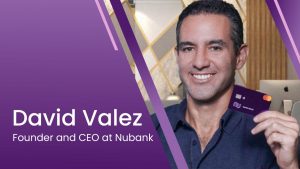Brazil’s neobank Nubank has made phenomenal growth in less than a decade of its operations and is giving tough competition for the traditional players in the country:

Nubank is Latin America’s largest fintech bank. Headquartered in Sao Paulo, Brazil, it has offices in Berlin, Germany, Buenos Aires, Argentina, and Mexico City, Mexico. It has 35 million customers in Brazil and neobanks another 3 million, elsewhere in the world, who make use of its NuConta. a digital account, an international credit card, both without fees, personal loans, life insurance products, and investments. The credit card, an international Mastercard, totally working on a mobile app, allows its users to track transactions in real-time, block their respective credit card, apply for a limit raise, and contact customer support.
Nubank was founded in 2013 by 3 people, Colombian David Vélez, Brazilian Cristina Junqueira, and American Edward Wible, as an ‘alternative to the red tape and exorbitant fees of the traditional banks’. The first transaction – using a Nubank card – was made on 1 April 2014 and 4 years later, it became a unicorn startup with a valuation of US$1 billion. Sequoia Capital, Founders Fund, Kaszek Ventures, Tiger Global Management, Goldman Sachs, Berkshire Hathaway, QED Investors, and DST Global have invested in the venture.
NEW PRODUCTS
Today, the bank has a digital account, NuConta, a loyalty program, Nubank Rewards, services like payments through debit and personal loans. In January 2020, it acquired Plataformatec, a company that specialized in software engineering and agile methodologies, Cognitect, responsible for Datomic and the Clojure programming language, and Easyinvest, an investment broker.
HELPING LGBTQIA COMMUNITY
Uniquely, about 30% of Nubank’s team belongs to the LGBTQIA+ community, and 40% of its employees across all positions are women. It is also funding the training of 1250 black programmers and has pledged investment of BRL 20 million in initiatives to increase black people in the company’s staff. Currently, it has more than 2000 employees, from more than 25 nationalities.
While its products and services are comparable with those offered by formal financial institutions, Nubank is not a bank as it does not have a banking license. It proposes to obtain a license in the near future so that it can step into the retail banking space in a big way.
Nubank essentially serves the unbanked or underserviced citizens in Brazil – about 30% of the population. While the banking system in Brazil is efficient and quite skillful, the customer service remains unbearable and fees charged are exorbitant for even a small transaction.
APPEALING TO BRAZILIANS
And Nubank appealed to Brazilians. It charged no annual fee and handled applications entirely through its app. Those who qualified were notified within minutes, and the cards arrived as soon as 2 days later. Plus, everything – from credit-line increase requests to bill paying and fraud reports – could be done through the app.
By contrast, almost all Brazilian banks charged annual fees for even basic credit cards – $20 the lowest. And that was just the start; the banks also charged monthly fees for everything from fraud protection to text message alerts. In 2019, fee-based income made up nearly 40% of Brazilian banks’ revenue, compared with 15% to 20% for banks in other countries in South America.
GROWTH PATH
Today, Nubank was growing fast. It booked $523 million in revenue, with a $78 million loss, in 2019 when the pandemic hit. Then it started growing faster. Like other fintech serving consumers, it benefited mightily from lockdowns and fear, as even older Brazilians took to banking via mobile phones and the web. In 2020, its revenue nearly doubled, to $963 million, while losses narrowed to $44 million.
Nubank expanded to Argentina and Mexico in 2019, and to Colombia in 2020. The bank, however, does not intend to enter North America.
David Vélez, the founder of the bank and a former Vice President at Sequoia Capital, who originally belonged to Columbia, has built the bank in less than a decade to be a Nonbank’s financial services powerhouse with 38 million customers and \valued at $25 billion. Vélez, who is CEO, retains a 23% stake in the bank, which is valued at around $5.2 billion. Financial experts describe the phenomenon of Nubank as nothing short of a real revolution, which is waking up the incumbent banks, which have had the going really easy for a long time. They also predict that Velez is going to build a $100+ billion financial powerhouse in Latin America. And what is impressive is that Vélez built his fintech firm while previously booming Brazil suffered through the recession, corruption scandals, and covid.







